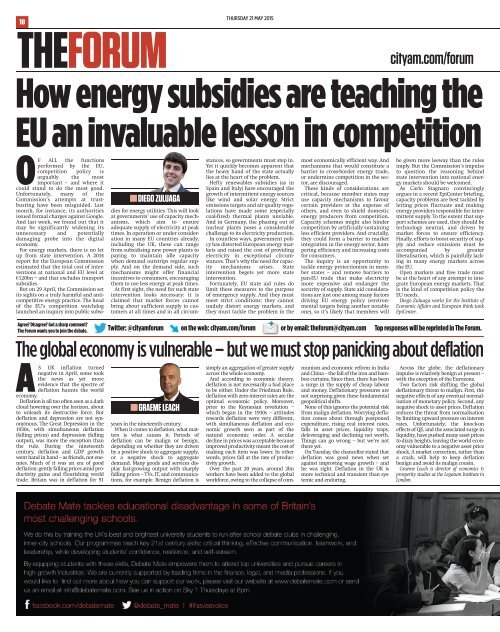Cityam 2015-05-21
Cityam 2015-05-21
Cityam 2015-05-21
Create successful ePaper yourself
Turn your PDF publications into a flip-book with our unique Google optimized e-Paper software.
18THEFORUMTHURSDAY <strong>21</strong> MAY <strong>2015</strong>cityam.com/forumHow energy subsidies are teaching theEU an invaluable lesson in competitionOF ALL the functionsperformed by the EU,competition policy isarguably the mostimportant – and where itcould stand to do the most good.Unfortunately, many of theCommission’s attempts at trustbustinghave been misguided. Lastmonth, for instance, its authoritiesissued formal charges against Google.And last week, we found out that itmay be significantly widening itsunnecessary and potentiallydamaging probe into the digitaleconomy.For energy markets, there is no letup from state intervention. A 2014report for the European Commissionestimated that the total cost of interventionsat national and EU level at€120bn – and that excludes transportsubsidies.But on 29 April, the Commission setits sights on a truly harmful and anticompetitiveenergy practice. The headof the EU’s competition watchdoglaunched an inquiry into public subsi-nDIEGO ZULUAGAdies for energy utilities. This will lookat governments’ use of capacity mechanisms,which aim to ensureadequate supply of electricity at peaktimes. In operation or under considerationin many EU countries already,including the UK, these can rangefrom subsidising new power plants topaying to maintain idle capacitywhen demand outstrips regular supply.And on the demand side, suchmechanisms might offer financialincentives to consumers, encouragingthem to use less energy at peak times.At first sight, the need for such stateintervention looks necessary: it isclaimed that market forces cannotbring about sufficient supply to customersat all times and in all circumstances,so governments must step in.Yet it quickly becomes apparent thatthe heavy hand of the state actuallylies at the heart of the problem.Hefty renewables subsidies (as inSpain and Italy) have encouraged thegrowth of intermittent energy sourceslike wind and solar energy. Strictemissions targets and air quality regulationshave made some (especiallycoal-fired) thermal plants unviable.And in Germany, the phasing out ofnuclear plants poses a considerablechallenge to its electricity production.In countless ways, government policyhas distorted European energy marketsand raised the cost of providingelectricity in exceptional circumstances.That’s why the need for capacitymechanisms arises. Stateintervention begets yet more stateintervention.Fortunately, EU state aid rules dolimit these measures to the purposeof emergency supply. And they mustmeet strict conditions: they cannotunduly distort energy markets, andthey must tackle the problem in themost economically efficient way. Andmechanisms that would constitute abarrier to cross-border energy trade,or undermine competition in the sector,are discouraged.These kinds of considerations arecritical, because member states mayuse capacity mechanisms to favourcertain providers at the expense ofothers, and even to shield domesticenergy producers from competition.Capacity schemes might also hindercompetition by artificially sustainingless efficient providers. And crucially,they could form a barrier to marketintegration in the energy sector, hamperingefficiency and increasing costsfor consumers.The inquiry is an opportunity totackle energy protectionism in memberstates – and remove barriers topan-EU trade that make electricitymore expensive and endanger thesecurity of supply. State aid considerationsare just one among many factorsdriving EU energy policy (environmentaltargets being another notableone), so it’s likely that members willbe given more leeway than the rulesimply. But the Commission’s impulseto question the reasoning behindstate intervention into national energymarkets should be welcomed.As Carlo Stagnaro convincinglyargues in a recent EpiCenter briefing,capacity problems are best tackled byletting prices fluctuate and makingenergy providers responsible for intermittentsupply. To the extent that supportschemes are used, they should betechnology neutral, and driven bymarket forces to ensure efficiency.Finally, efforts to boost security of supplyand reduce emissions must beaccompanied by greaterliberalisation, which is painfully lackingin many energy markets acrossthe EU.Open markets and free trade mustbe at the heart of any attempt to integrateEuropean energy markets. Thatis the kind of competition policy theEU needs.Diego Zuluaga works for the Institute ofEconomic Affairs and European think tankEpiCenter.Agree? Disagree? Got a sharp comment?The Forum wants you to join the debate.AS UK inflation turnednegative in April, some tookthe news as yet moreevidence that the spectre ofdeflation haunts the worldeconomy.Deflation is all too often seen as a darkcloud hovering over the horizon, aboutto unleash its destructive force. Butdeflation and depression are not synonymous.The Great Depression in the1930s, with simultaneous deflation(falling prices) and depression (fallingoutput), was more the exception thanthe rule. During the nineteenthcentury, deflation and GDP growthwent hand in hand – as friends, not enemies.Much of it was an era of gooddeflation: gently falling prices amid productivitygains and flourishing worldtrade. Britain was in deflation for 51Twitter: @cityamforum on the web: cityam.com/forum or by email: theforum@cityam.comyears in the nineteenth century.When it comes to deflation, what mattersis what causes it. Periods ofdeflation can be malign or benign,depending on whether they are drivenby a positive shock to aggregate supply,or a negative shock to aggregatedemand. Many goods and services displayfast-growing output with sharplyfalling prices – TVs, IT, and communications,for example. Benign deflation issimply an aggregation of greater supplyacross the whole economy.And according to economic theory,deflation is not necessarily a bad placeto be either. Under the Friedman Rule,deflation with zero interest rates are theoptimal economic policy. Moreover,prior to the Keynesian revolution –which began in the 1930s – attitudestowards deflation were very different,with simultaneous deflation and economicgrowth seen as part of thenatural economic order. A seculardecline in prices was acceptable becauseimproved productivity meant the cost ofmaking each item was lower. In otherwords, prices fall at the rate of productivitygrowth.Over the past 20 years, around 2bnworkers have been added to the globalworkforce, owing to the collapse of communismand economic reform in Indiaand China – the fall of the iron and bamboocurtains. Since then, there has beena surge in the supply of cheap labourand money. Deflationary pressures arenot surprising given these fundamentalgeopolitical shifts.None of this ignores the potential riskfrom malign deflation. Worrying deflationcomes about through postponedexpenditure, rising real interest rates,falls in asset prices, liquidity traps,deleveraging and declining net worth.Things can go wrong – but we’re notthere yet.On Tuesday, the chancellor stated thatdeflation was good news when setagainst improving wage growth – andhe was right. Deflation in the UK ismore technical and transient than systemicand enduring.Top responses will be reprinted in The Forum.The global economy is vulnerable – but we must stop panicking about deflationnGRAEME LEACHAcross the globe, the deflationaryimpulse is relatively benign at present –with the exception of the Eurozone.Two factors risk shifting the globaldeflationary threat to malign. First, thenegative effects of any eventual normalisationof monetary policy. Second, anynegative shock to asset prices. Deflationreduces the threat from normalisationby limiting upward pressure on interestrates. Unfortunately, the knock-oneffects of QE, and the associated surge inliquidity, have pushed many asset pricesto dizzy heights, leaving the world economyvulnerable to a negative asset priceshock. A market correction, rather thana crash, will help to keep deflationbenign and avoid its malign cousin.Graeme Leach is director of economics &prosperity studies at the Legatum Institute inLondon.

















